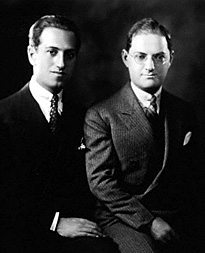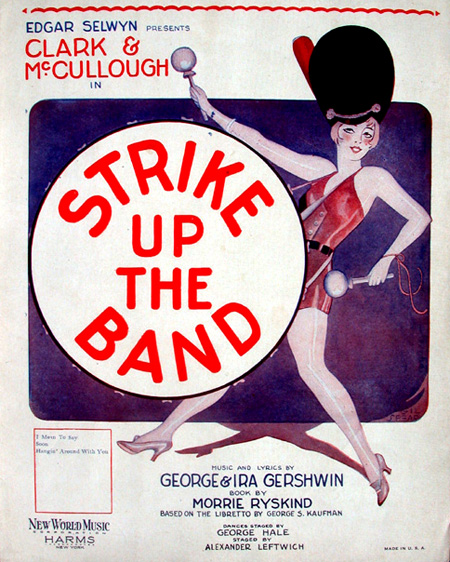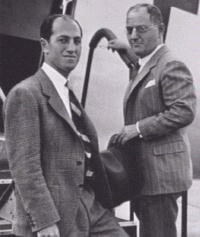George and Ira Gershwin wrote many of the finest popular songs and orchestral pieces of the 20th century.
Think of the opening clarinet glissando from Rhapsody in Blue, the taxi horn theme from An American in Paris —and their songs, "I Got Rhythm," "Embraceable You," "The Man I Love," "Someone to Watch Over Me," "Fascinating Rhythm" and more. George and Ira's music is so instantly recognizable, it's embedded in our national consciousness.

Nina Ferro photo courtesy of the artist
On this week's radio show, Australian vocalist Nina Ferro joins The Jim Cullum Jazz Band to celebrate the work of George and Ira Gershwin.
Born in Brooklyn in 1898, George Gershwin rose from modest beginnings as a teenage song plugger on Tin Pan Alley to become a popular and very successful composer. He often said he simply 'trapped tunes' as they 'floated in the air.' He worked fast at his songwriting and he liked to play hard, allowing time for his favorite pastimes—golf and attractive women.
As a child, George was outgoing and athletic, and he wasn't much interested in school. He'd often cut class, roam around the city, get in a scuffle and wind up coming home with a black eye. His brother Ira was the quiet one. Older than George by two years, he always had his nose in a book. He was a soft-spoken, shy boy peering out at the world from behind wire-rimmed spectacles. In high school, Ira developed a lifelong friendship with another clever young man, Yip Harburg, who also became a famous lyricist. Harburg is known for writing the words to "Over the Rainbow" and the rest of the lyrics in the spectacular Warner Brothers movie score The Wizard of Oz.

George and Ira Gershwin photo courtesy last.fm
As an adult, Ira took his time writing. He'd spend hour after hour polishing his witty lyrics, which nonetheless seem to be lightly tossed off. Many of Ira's lyrics have become so much a part of how we express what we think and feel about love and life that we almost forget who wrote them. His phrases have become so familiar, they're simply absorbed into our language. When asked one of the eternal questions of his life: "Which comes first, the music or the words?" Ira Gershwin always answered, "The contract!"
It was typical of Ira to use humor to take himself out of the spotlight. He had a deep affection for his brother, and Ira would be the first to defer to George as the genius in the family. Working in George's dynamic presence, it was easy for Ira's contribution to be underplayed. He became 'the other Gershwin.' But Ira's wit is a large part of the success and the lasting value of the Gershwin legacy. His careful way with words earned Ira the nickname, "The Jeweler."
The jazz sensibility of the 1920s and 30s is felt throughout the body of work the Gershwin brothers created. "One of the things [George] made a point of was being an American composer," says Gershwin scholar Edward Jablonski. "Jazz was an American music and so whatever he felt in the music, he based his own writing on. And apparently, the wonderful structures that he made, real jazz musicians loved also."

Strike Up the Band sheet music, 1930. Image courtesyjazzage.blogspot
The Gershwins collaborated on numerous musical scores including Strike Up the Band, Girl Crazy, and Of Thee I Sing, the first musical comedy to win the Pulitzer Prize in drama. In addition to his achievements with American popular song, George Gershwin pursued an ambitious career in the classical tradition. After the premiere of Rhapsody in Blue in 1924, George went on to write his Preludes for Piano, An American in Paris, and the folk opera Porgy and Bess. Porgy and Bess was not an immediate commercial or critical success, yet the work has become one of Gershwin’s most popular, due in part, to the many landmark interpretations by jazz artists Miles Davis, Gil Evans, Louis Armstrong, Ella Fitzgerald, and others, including The Jim Cullum Jazz Band.
After Porgy and Bess closed on Broadway, George and Ira Gershwin moved to Hollywood. In this final phase of George's career, he wrote songs for movie soundtracks including, Shall We Dance, A Damsel in Distress, and The Goldwyn Follies. George Gershwin died suddenly of a brain tumor in 1937. "Love Walked In," the last song George and Ira Gershwin composed together, made it to number one on Your Hit Parade for fourteen weeks in 1938.
Love walked right in and drove the shadows away,
Love walked right in and brought my sunniest day.
One magic moment and my heart seemed to know
That love said "Hello,"
Though not a word was spoken...
Photo credit for home page teaser image: George and Ira Gershwin. Photo courtesy Gershwinfan.com
Text based on Riverwalk Jazz script by Margaret Moos Pick ©2001


